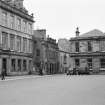Following the launch of trove.scot in February 2025 we are now planning the retiral of some of our webservices. Canmore will be switched off on 24th June 2025. Information about the closure can be found on the HES website: Retiral of HES web services | Historic Environment Scotland
Haddington, 52 High Street, City Bank
Bank (Financial) (Late 19th Century) (1870)
Site Name Haddington, 52 High Street, City Bank
Classification Bank (Financial) (Late 19th Century) (1870)
Canmore ID 208144
Site Number NT57SW 249
NGR NT 51483 73868
Datum OSGB36 - NGR
Permalink http://canmore.org.uk/site/208144
- Council East Lothian
- Parish Haddington
- Former Region Lothian
- Former District East Lothian
- Former County East Lothian
NT57SW 249 51483 73868
NT 514 738 - Sinclair McGill Building - A watching brief was carried out during ground investigation work consisting of three trial pits and three boreholes in and around existing buildings on High Street, Haddington in advance of conversion for use as a new Library, Museum and Achive facility. The boreholes and starter pits demonstrated that there has been considerable ground disturbance in the past for the insertion of utility services, with most of the pits displaying deposits of backfill and made ground. Borehole 1 starter pit and Trial Pit 1 identified the remains of a cobbled road surface immediately below the present ground surface on the north and south sides of the building. This surface likely relates to an earlier phase of road surfacing and may be medieval and more recent in date. No other features or deposits of archaeological significance were recorded.
Sponsor: East Lothian Council
Alisdair Curtis, 2007.
Standing Building Recording (October 2009)
Archaeological Evaluation (1 March 2010 - 31 August 2011)
A programme of works was carried out by CFA Archaeology Ltd prior to and during alterations at 52-54 High Street, Haddington on behalf East Lothian Council. These included a Historic Building Appraisal, an Evaluation and Watching Brief, a Building Survey, and a second Watching Brief which included further building recording. Pre-construction engineering and archaeological test-pits revealed historic walls and cobbled surfaces. Internal monitoring during construction revealed further elements of the historic building fabric, these included domestic fireplaces predating the use of the structure as a grain store. A pit and a well were recorded. External monitoring recorded the truncated walls of a building which were associated with 18-19 century ceramics and which may underlie the Grain Store.
Information from Oasis (cfaarcha1-71422) 16 January 2013








